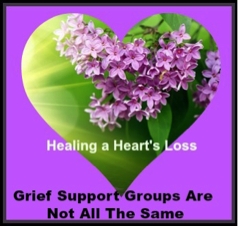Grief support groups are not all created equal. Grief is unique to the individual and having a variety of groups to choose from may be beneficial. Be informed and know what you need. Know if you are appropriate for group sessions or if group work is appropriate for you.
Grief support groups can be opened or closed. Open, meaning that anyone with a loss can come and go from the group as need be; there could be 5 people one week and 20 people the next week. Some such groups for example, may run weekly or monthly and may have different topics of discussion each time.
Depending on the support group, you may want to ask the facilitator(s) if you can focus on a specific topic that is of interest to you. This may be due to a recent concern that is affecting you and chances are it is or has affected someone else.
Closed support groups have a set number of individuals who are accepted into the group and often there are a set number of sessions, such as 8 to 10. Closed groups ensure no one except the group participants hear your story; for some people it is easier to share concerns in a closed group.
You can quickly feel safe and may be able to share your concerns easier when you know the participants are not going to be different the following week. Closed groups are often smaller in nature to make it easier to get to know each other and to give each participant time to talk about the information presented during the allotted time. The best group is one where you feel safe and have time to share.
Specific shared experience support groups are often closed groups; such as Suicide Survivors support groups where a unique bonding experience occurs because everyone there has a suicide loss. Other such groups may be for cancer, child loss, Alzheimer and more.
This information is not all inclusive. There are many different grief support groups in your community. Some have a religious component to them, while others may touch on religion or spirituality; there is no right or wrong way to present a grief support group. Find the one that fits your needs.
Do you feel no one cares, no one is like me or I cannot walk into that place with strangers? Try a support group; you may be surprised at the outcome.
Be aware of your present ability to be around a group of people and if this is not something that seems comfortable at this moment, then perhaps one on one counselling may be what is needed. Talking to anyone can help ease your burden of grief. This is not to say that later on you might like to try a grief support group. Start someplace when you are ready.

